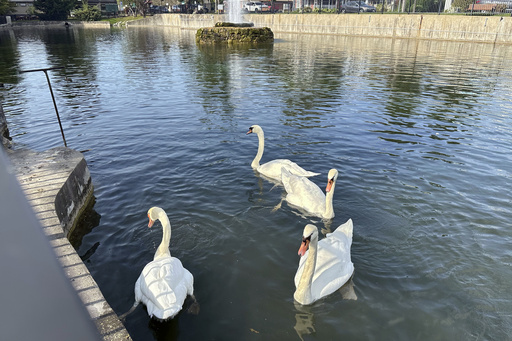MANLIUS, N.Y. — The picturesque village of Manlius, nestled in upstate New York and spanning just under 2 square miles, is famed for its graceful white swans. The swans are cherished symbols that adorn village flags, community centers, and welcoming signs. Each autumn, the local residents take pride in celebrating “Swan Fest,” a tradition that draws attention to these elegant creatures.
Residents find it hard to envision Manlius without the mute swans that have graced a central pond for over a century. However, the tranquil existence of the swans was disrupted in 2023 when one of them was brutally killed, igniting a contentious debate with state regulators about their future in the village. This dilemma pits the local community’s desire to preserve the swans against a state perspective that identifies them as an invasive species causing various problems.
By the year’s end, officials in Manlius must decide between two difficult choices: either sterilize the four mute swans currently residing in the pond or retain just two of the same gender. Both options would mean the end of the village’s routine of witnessing the swans raise their young, marking a potential decline in their presence in the community.
“The significance of these swans to our village is something that appears lost on those in authority,” expressed Mayor Paul Whorrall, who has lived in Manlius all his life and fondly recalls passing the swan pond on his childhood paper route. “Removing the swans would strip away an essential part of our village’s identity.”
New York state has increasingly sought to manage the population of mute swans, categorizing them as invasive after their introduction from Europe in the late 1800s. Originally kept on private estates to enhance landscape beauty, many swans escaped or were freed into the wild, resulting in a population boom, particularly on Long Island, where approximately 2,200 now reside.
However, the Department of Environmental Conservation (DEC) has raised alarms about the negative impact of these large birds on local ecosystems. The swans produce significant waste that degrades water quality and consume vast amounts of submerged vegetation, potentially up to 8 pounds per day. Weighing between 20 to 25 pounds and spanning nearly 7 feet with their wings, these swans have also been known to display aggressive behavior towards humans and have disrupted native wildlife.
According to a management plan established in 2019, possessing mute swans requires permission from the DEC. Manlius was issued a license valid until 2025, which permitted the village to maintain a pair of adult swans who would raise cygnets each spring. However, this arrangement unraveled last year when three teenagers from Syracuse were reported to have scaled a fence, captured Faye and her four cygnets, and tragically decapitated Faye. Although the cygnets were located and returned to the pond, the remaining adult swan, Manny, showed aggression towards them and was relocated to Pennsylvania. As a result, only four young swans now inhabit the pond—two males and two females.
This shift means that the village’s license terms are no longer met, as the village is required to have at least two adult swans. A revised license allowing for the four swans will expire at year-end. Many villagers are concerned that the options on the table, either sterilizing the current swans or keeping only one sex, could eliminate mute swans from Manlius entirely. The DEC has even suggested the alternative of breeding trumpeter swans instead, a proposal met with widespread disapproval within the community.
“I can’t see any reason not to allow them to stay here,” remarked 89-year-old resident Martha Ballard Lacy, who has developed a fondness for swans during her daily walks around the pond. She often captured beautiful moments of Manny and Faye with her camera as they nurtured their nest of eggs. “The community takes pride in having a distinct identity shaped by the presence of these swans, which have been part of our lives for a century.”
The state has continually grappled with the mute swan issue. A move in 2013 declared an intention to eliminate free-ranging mute swans in New York by 2025, triggering public backlash due to proposals of euthanasia and egg destruction. Consequently, the DEC adjusted its approach in 2019, focusing on stabilizing or reducing the population through nonlethal measures such as egg-addling, while still permitting lethality under certain circumstances for swans that cannot be relocated.
Though Whorrall doesn’t dispute the challenges posed by mute swans in other areas, he argues that targeting the Manlius population will not contribute to solving the overarching problem. The swans have been contained within a fenced pond, where they receive protection and a specialized diet. On a recent sunny day, a local resident fed the swans cracked corn, prompting them to dive for their treat.
As the December 31 deadline approaches, Whorrall remains committed to preserving the swans, stating that the village has complied with all state requests, including setting up educational displays about the birds. The village had even proposed sterilizing any offspring before relocating them to preserve the breeding tradition, but the DEC later retracted this option. In a recent communication, the DEC reiterated its commitment to working alongside Manlius to align its swan management practices with broader state and regional conservation goals.
For the residents of Manlius, the loss of Faye feels all the more devastating. “Crimes happen, unfortunately, and all one can do is try to adapt,” expressed Whorrall. “We are doing our best to move forward here, but the regulations make that very challenging.”
